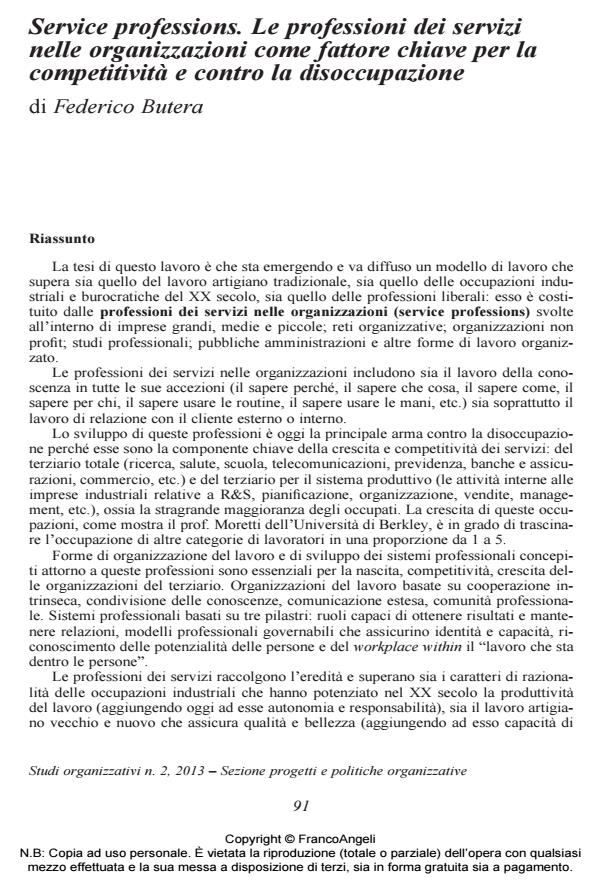Service professions. Le professioni dei servizi nelle organizzazioni come fattore chiave per la competitività e contro la disoccupazione
Titolo Rivista STUDI ORGANIZZATIVI
Autori/Curatori Federico Butera
Anno di pubblicazione 2014 Fascicolo 2013/2
Lingua Italiano Numero pagine 46 P. 91-136 Dimensione file 187 KB
DOI 10.3280/SO2013-002004
Il DOI è il codice a barre della proprietà intellettuale: per saperne di più
clicca qui
Qui sotto puoi vedere in anteprima la prima pagina di questo articolo.
Se questo articolo ti interessa, lo puoi acquistare (e scaricare in formato pdf) seguendo le facili indicazioni per acquistare il download credit. Acquista Download Credits per scaricare questo Articolo in formato PDF

FrancoAngeli è membro della Publishers International Linking Association, Inc (PILA), associazione indipendente e non profit per facilitare (attraverso i servizi tecnologici implementati da CrossRef.org) l’accesso degli studiosi ai contenuti digitali nelle pubblicazioni professionali e scientifiche.
La tesi di questo lavoro è che sta emergendo e va diffuso un modello di lavoro che supera sia quello del lavoro artigiano tradizionale, sia quello delle occupazioni industriali e burocratiche del XX secolo, sia quello delle professioni liberali: esso è costituito dalle professioni dei servizi nelle organizzazioni (service professions) svolte all’interno di imprese grandi, medie e piccole; reti organizzative; organizzazioni non profit; studi professionali; pubbliche amministrazioni e altre forme di lavoro organizzato. Le professioni dei servizi nelle organizzazioni includono sia il lavoro della conoscenza in tutte le sue accezioni (il sapere perché, il sapere che cosa, il sapere come, il sapere per chi, il sapere usare le routine, il sapere usare le mani, etc.) sia soprattutto il lavoro di relazione con il cliente esterno o interno. Lo sviluppo di queste professioni è oggi la principale arma contro la disoccupazione perché esse sono la componente chiave della crescita e competitività dei servizi: del terziario totale (ricerca, salute, scuola, telecomunicazioni, previdenza, banche e assicurazioni, commercio, etc.) e del terziario per il sistema produttivo (le attività interne alle imprese industriali relative a R&S, pianificazione, organizzazione, vendite, management, etc.), ossia la stragrande maggioranza degli occupati. La crescita di queste occupazioni, come mostra il prof. Moretti dell’Università di Berkley, è in grado di trascinare l’occupazione di altre categorie di lavoratori in una proporzione da 1 a 5. Forme di organizzazione del lavoro e di sviluppo dei sistemi professionali concepiti attorno a queste professioni sono essenziali per la nascita, competitività, crescita delle organizzazioni del terziario. Organizzazioni del lavoro basate su cooperazione intrinseca, condivisione delle conoscenze, comunicazione estesa, comunità professionale. Sistemi professionali basati su tre pilastri: ruoli capaci di ottenere risultati e mantenere relazioni, modelli professionali governabili che assicurino identità e capacità, riconoscimento delle potenzialità delle persone e del workplace within il "lavoro che sta dentro le persone". Le professioni dei servizi raccolgono l’eredità e superano sia i caratteri di razionalità delle occupazioni industriali che hanno potenziato nel XX secolo la produttività del lavoro (aggiungendo oggi ad esse autonomia e responsabilità), sia il lavoro artigiano vecchio e nuovo che assicura qualità e bellezza (aggiungendo ad esso capacità di fornire servizi di alto valore insieme a tutta l’organizzazione), sia la formazione, giurisdizione e responsabilità delle libere professioni (aggiungendo ad esse la cooperazione all’interno delle organizzazioni). La disoccupazione si combatte principalmente creando posti di lavoro che siano componenti dei modi di produzione che si stanno sviluppando: la competizione con i paesi dove il costo del lavoro è basso si gioca nell’aggiungere valore alla manifattura, nell’integrare prodotti e servizi, nel produrre servizi di alto valore. Questa missione è affidata ai lavoratori della conoscenza che operano nelle organizzazioni in relazione con il cliente finale o con il cliente interno, ossia professionisti dei servizi nelle organizzazioni. Essi vanno formati da scuole e università migliori, regolati da sistemi fiscali e regolativi che incentivino il loro impiego, inseriti in forme di organizzazione del lavoro che ne potenzino produttività e creatività, in sistemi professionali che riconoscano e sviluppino il loro emergente paradigma come componente dei servizi e fonte di miglioramento della qualità della vita di lavoro. Occorre, in sintesi, concepire e rafforzare un "futuro professionale". In questo lavoro si propone l’apertura, valorizzazione, supporto, diffusione di piccoli e grandi progetti esemplari nelle imprese, nelle Pubbliche Amministrazioni che abbiano come oggetto la progettazione e sviluppo di forme innovative di organizzazione del lavoro, di mestieri e di professioni, di gestione della mobilità, di formazione e sviluppo delle persone. Progetti che, dando luogo a casi esemplari e best practices, abbiano la missione di migliorare in modo significativo innovazione e produttività delle organizzazioni, qualità della vita di lavoro e creare occupazione qualificata.
- Famiglie migranti e minori con disabilità. Problematiche e prospettive della presa in carico Giovanni Giulio Valtolina, Nicoletta Pavesi, in MONDI MIGRANTI 3/2022 pp.61
DOI: 10.3280/MM2022-003004 - Futuro professionale: dal taylor- fordismo ai nuovi modi di produzione. I frantumi ricomposti, 1971-20151 Federico Butera, in STUDI ORGANIZZATIVI 2/2015 pp.155
DOI: 10.3280/SO2014-002006 - Il Sistema di Imprese della Cooperazione Sociale: Origini e Sviluppo dei Consorzi di Cooperative Sociali (Networking Among Social Cooperatives: Origins and Development of Consortia) Carlo Borzaga, Alberto Ianes, in SSRN Electronic Journal /2011
DOI: 10.2139/ssrn.1793170 - Note sulla storia dell'automazione. Dall'impatto sociale dell'automazione alla progettazione congiunta di tecnologia, organizzazione e sviluppo delle persone Federico Butera, in STUDI ORGANIZZATIVI 1/2014 pp.129
DOI: 10.3280/SO2014-001006
Federico Butera, Service professions. Le professioni dei servizi nelle organizzazioni come fattore chiave per la competitività e contro la disoccupazione in "STUDI ORGANIZZATIVI " 2/2013, pp 91-136, DOI: 10.3280/SO2013-002004